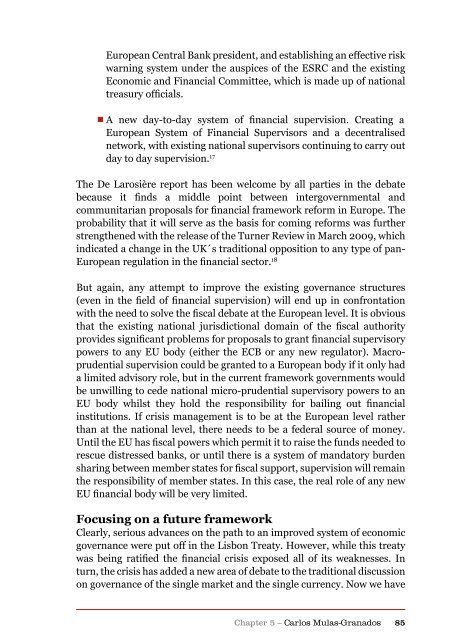Authors Iain Begg | Gabriel Glöckler | Anke Hassel ... - The Europaeum
Authors Iain Begg | Gabriel Glöckler | Anke Hassel ... - The Europaeum
Authors Iain Begg | Gabriel Glöckler | Anke Hassel ... - The Europaeum
You also want an ePaper? Increase the reach of your titles
YUMPU automatically turns print PDFs into web optimized ePapers that Google loves.
European Central Bank president, and establishing an effective risk<br />
warning system under the auspices of the ESRC and the existing<br />
Economic and Financial Committee, which is made up of national<br />
treasury officials.<br />
n A new day-to-day system of financial supervision. Creating a<br />
European System of Financial Supervisors and a decentralised<br />
network, with existing national supervisors continuing to carry out<br />
day to day supervision. 17<br />
<strong>The</strong> De Larosière report has been welcome by all parties in the debate<br />
because it finds a middle point between intergovernmental and<br />
communitarian proposals for financial framework reform in Europe. <strong>The</strong><br />
probability that it will serve as the basis for coming reforms was further<br />
strengthened with the release of the Turner Review in March 2009, which<br />
indicated a change in the UK´s traditional opposition to any type of pan-<br />
European regulation in the financial sector. 18<br />
But again, any attempt to improve the existing governance structures<br />
(even in the field of financial supervision) will end up in confrontation<br />
with the need to solve the fiscal debate at the European level. It is obvious<br />
that the existing national jurisdictional domain of the fiscal authority<br />
provides significant problems for proposals to grant financial supervisory<br />
powers to any EU body (either the ECB or any new regulator). Macroprudential<br />
supervision could be granted to a European body if it only had<br />
a limited advisory role, but in the current framework governments would<br />
be unwilling to cede national micro-prudential supervisory powers to an<br />
EU body whilst they hold the responsibility for bailing out financial<br />
institutions. If crisis management is to be at the European level rather<br />
than at the national level, there needs to be a federal source of money.<br />
Until the EU has fiscal powers which permit it to raise the funds needed to<br />
rescue distressed banks, or until there is a system of mandatory burden<br />
sharing between member states for fiscal support, supervision will remain<br />
the responsibility of member states. In this case, the real role of any new<br />
EU financial body will be very limited.<br />
Focusing on a future framework<br />
Clearly, serious advances on the path to an improved system of economic<br />
governance were put off in the Lisbon Treaty. However, while this treaty<br />
was being ratified the financial crisis exposed all of its weaknesses. In<br />
turn, the crisis has added a new area of debate to the traditional discussion<br />
on governance of the single market and the single currency. Now we have<br />
Chapter 5 – Carlos Mulas-Granados 85

















